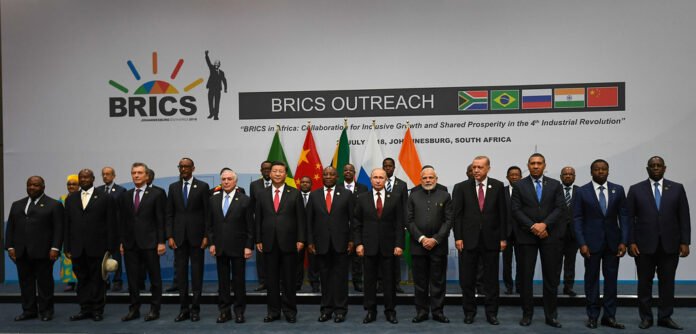On April 2, 2025, U.S. President Donald Trump’s declaration of universal “reciprocal” tariffs sent ripples through global markets, marking what many commentators have called the death knell of the post–World War II rules-based system. The 100 percent levies on imports from major trading partners—including Southeast Asia—underscored a turn toward unilateralism, protectionism, and economic nationalism under the banner of “Making America Great Again.”
A Dangerous New Era
Analysts warn that Trump’s aggressive trade stance, coupled with broader geoeconomic measures, risks fracturing the multilateral frameworks that have underpinned global growth for decades. For Southeast Asian nations—already juggling U.S.–China strategic competition—this policy upheaval has intensified the search for alternative partnerships that can hedge against Washington’s unpredictability.
BRICS Resurgent: From Emerging Market Club to Major Geostrategic Player
Origins and Early Expansion
Launched in 2006 by Brazil, Russia, India, China and South Africa, the BRICS grouping initially focused on coordinating macroeconomic policy among large emerging markets. But Russia’s 2022 invasion of Ukraine, and subsequent Western sanctions, spurred new interest among developing countries in a bloc perceived as a counterweight to Western financial hegemony.
The Kazan Summit and Beyond
At the 16th BRICS summit in Kazan, Russia, in October 2024, four additional members (Egypt, Ethiopia, Iran and the UAE) and nine “partner countries” were admitted, reflecting the growing appeal of an organization that challenges dollar dominance and offers multimodal economic cooperation. By January 2025, Indonesia became the first Southeast Asian nation to join as a full member, signaling a deeper regional shift.
Southeast Asia’s Diverse Responses
Indonesia: From Nonalignment to Active Membership
Under President Prabowo Subianto, Indonesia has pursued a more assertive “globalist” foreign policy. Joining BRICS enables Jakarta to diversify its strategic options beyond ASEAN and the West, amplifying its role in global governance. While it maintains concerns about China’s influence within BRICS, Indonesia views membership as essential insurance against U.S. protectionism—and as a platform to champion issues like Palestinian statehood.
Malaysia: Partner Status as Political Capital
Malaysia’s 2025 ASEAN chairmanship under Prime Minister Anwar Ibrahim coincided with its bid for BRICS “partner” status. Kuala Lumpur’s move reflects its opposition to Israeli military actions in Gaza, alignment with Global South solidarity, and desire to leverage BRICS affiliation for domestic political dividends. By framing BRICS partnership as a hallmark of Anwar’s forward-looking leadership, Malaysia seeks both foreign investment and electoral support.
Thailand: Rapid Partnership for a Quick Win
Thailand led Southeast Asia’s early outreach to BRICS in mid-2024 under then-Prime Minister Srettha Thavisin. Eager for a headline-grabbing achievement amid stalled OECD accession talks, Bangkok secured partner status by January 2025. For Thailand, BRICS affiliation serves as a diplomatic “quick deliverable,” offsetting internal political gridlock and underscoring its multipolar foreign policy.
Vietnam: Trading Leverage and Strategic Diversification
In mid-June 2025, Vietnam became the 10th BRICS partner, driven by its record trade surplus with the U.S. and concern over Trump’s looming tariffs. Hanoi sees BRICS affiliation as a means to diversify export markets, attract non-Western investment, and reduce vulnerability to dollar-denominated sanctions or levies—without abandoning its existing U.S. and ASEAN relationships.
Risks and Rewards for Southeast Asia
Geoeconomic Hedging vs. Autocratic Pressures
BRICS membership affords its partners access to the New Development Bank and pooled infrastructure financing, as well as broader political solidarity within the Global Majority. Yet the bloc’s core remains dominated by authoritarian regimes—Russia, China, Iran and others—raising worries that democratic reforms in Indonesia, Malaysia and Thailand could stall under autocratic influence.
The Dollar vs. De-Dollarization Debate
Trump’s threat of retaliatory tariffs against any BRICS country that pursued an alternative reserve currency underscores the enduring power of the U.S. economy. Although de-dollarization is a recurring BRICS rallying cry, few practical substitutes exist in the near term. Southeast Asian economies must balance the potential gains from a multipolar currency regime against the risk of U.S. financial retaliation.
Outlook: Navigating a Shifting Order
Scenario 1: Continued U.S. Belligerence Spurs Deeper BRICS Ties
Should the Biden administration’s departure give way to further Trump-style geoeconomic weaponization, Southeast Asian states may intensify their BRICS engagement, deepening trade and investment links with China, India and other partners. In this scenario, BRICS transforms into a robust counter-bloc capable of challenging Western-led institutions.
Scenario 2: Measured U.S. Policy Tempering Appeals of BRICS
If the new U.S. administration adopts a less combative trade posture—retaining some multilateral commitments—then the urgency to embrace BRICS may fade. Southeast Asian governments would continue hedging but remain anchored to Washington, preserving a delicate equilibrium among the world’s major powers.
Conclusion: Between Dollar Hegemony and Multipolar Promise
President Trump’s tariff gambit has accelerated Southeast Asia’s turn toward BRICS as both an economic firewall and a platform for Global South unity. Yet the region’s dynamic democracies will proceed cautiously, mindful that BRICS’s autocratic core and Washington’s enduring clout obligate a calibrated, multi-vector foreign policy. As global geopolitics splinters, Southeast Asia’s embrace of BRICS underscores its quest for strategic autonomy—but the ultimate shape of the emerging order will hinge on whether BRICS can deliver concrete economic dividends without undermining democratic resilience.
READ MORE: Top Global Health Leaders Convene for High-Level Diplomacy Masterclass in Sweden
